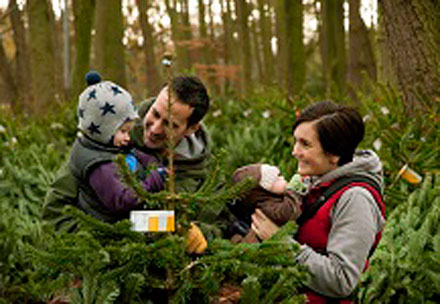A revised FSC Forest Stewardship Standard for Germany now expands to cover Christmas trees, venison, and other forest products. The standard becomes effective on 1 November 2024. Source: Timberbiz
Germany harvests about 20 million Christmas trees each year, a quarter of the European market. Now, some of those trees will be FSC certified in accordance with a new version of the Forest Stewardship Standard for Germany.
Christmas trees represent a quite specific product for FSC certification. They are generally harvested by clear felling of a stand of similar-aged trees, which the current Standard forbids, and they do not produce timber. For that reason, they are considered non-timber forest products (NTFP), along with things like nuts, mushrooms, and venison, which are also included in the new standard.
The Standard was developed after two public consultations that involved a wide range of stakeholders, including forestry companies. A new appendix covers NTFPs and includes not only Christmas trees but also decorative brushwood, honey, mushrooms, fruit, seeds, and venison. In addition, FSC Germany members further confirmed the new version of the Forest Stewardship Standard at its 33rd General Assembly.
Christmas trees and game meat are currently the most frequently marketed NTFPs in Germany. The new standard will allow FSC companies to offer these products with the FSC label and thus differentiate themselves from conventional forestry operations.
For companies and local economies, certification of NFTPs helps to reduce dependency on timber sales as well as to generate income from lesser-known products. Marketing non-timber forest products is also an important step in reorienting forest management towards more versatility and ecosystem services, especially as the climate emergency damages the forest, with consequent losses in timber sales.
For consumers, the Standard’s ban on the use of pesticides is a further benefit. Residues of harmful chemicals have been found on conventional Christmas trees. FSC-certified trees will contain no such residues. Consumers will also be reassured that peat is prohibited and that non-native species must be harvested before they flower, which will prevent them from spreading into natural forests.
Game meat, notably venison from deer, will also be safer because the animals will be guaranteed not to encounter pesticides on the food they forage in certified forests. The standard also requires hunters to use lead-free ammunition, which means that game meat from certified forests will not contain harmful heavy metals.
“The new Standard is a great improvement for producers and consumers,” said Jens -Birger Bosse, manager of biological production and responsible for FSC certification at Landesforsten Schleswig-Holstein with 46.000 ha FSC certified forest.
“Producers can show that their operations are more sustainable and better for the environment, which is exactly what consumers are looking for, in Christmas trees and all the other non-timber forest products our forests have to offer.”






